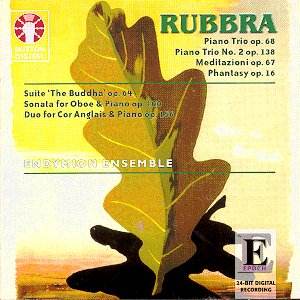Edmund RUBBRA (1901-1986)
Piano Trio in One Movement (1950)
Meditazioni sopra 'Cœurs Désolés'
(1949)
Phantasy for two violins and piano (1927)
Oboe Sonata (1958)
Suite The Buddha [arr Adrian Cruft] (1947)
Piano Trio No. 2 (1960s)
Duo for cor anglais and piano
(1980)
 The Endymion Ensemble
The Endymion Ensemble
Michael Dussek (piano) (all works except Buddha)
Krysia Osostowicz (violin) (Trios, Phantasy, Buddha)
Jane Salmon (cello) (Trios and Buddha)
Melinda Maxwell (oboe/cor anglais) (Duo, Oboe Sonata and
Meditazioni)
Catherine Manson (violin/viola) (Phantasy, Buddha)
Helen Keen (flute) (Buddha)
rec All Saints Church, East Finchley, London, 3-5 April
2000
 DUTTON CDLX 7106
[77.01]
DUTTON CDLX 7106
[77.01]
Crotchet AmazonUK
AmazonUS

After recording the violin sonatas Dutton move on with agreeable remorselessness
to the other chamber works. I rather hope that Dutton will duplicate the
four string quartets or seek a licence from whoever now holds the IPR for
the Sterling Quartets Conifer DATs.
Melinda Maxwell's delicate tone painting and dancing delicacy tickles and
caresses the ears in the fantasy on Josquin's air Cœurs
Désolés. The work was originally written for recorder
and harpsichord (I have known the work in this form for many years from a
BBC broadcast) but the composer indicated that flute or oboe may be used
and that the piano can be substituted for the harpsichord. This is a lovely
piece with a fey oriental twist at times. It is well worth hearing.
Its opening bars follow the same melodic line as the Fourth Symphony. Maxwell
exchanges the oboe for the cor anglais for the equally brief but dour and
dissonant (in the piano part) Duo - the only tough essay on
the disc. It was written for and recorded by Peter Bree in 1980.
The Phantasy is dedicated to fellow 2001 centenarian, Gerald
Finzi. This work is not typical Rubbra. It has more fellow feeling with Dunhill's
violin sonatas and the early sonatas of Howell and John Ireland than with
Rubbra's fully developed style. The composer was only 26 when it was written.
The Oboe Sonata is lean (and succulent at the same time) with a warm
ambience and, as in the case of the Meditazioni, the key action
is either inaudible or so quiet as to hardly be there at all. This is an
exceptionally beautiful work written in a molten aureate flow of melody.
The whirlpool of melody in the Presto (with its echoes of the Piano
Concerto and the Fifth Symphony) makes you regret that Rubbra never wrote
an Oboe Concerto. A Concerto of the eminence of the sonata would have made
a glowing coupling if there had been room on the recent ASV/Alan Cuckston
CD.
The five movements of The Buddha suite were written for a radio
play by Clifford Bax. The scoring was originally for flute, oboe and string
quartet but Adrian Cruft (always a solicitous and sensitive soul and a fine
composer in his own right) was selected to make the present arrangement.
The music is faintly oriental, certainly elusive, melodic and clear, eerie
in The Ascetics movement, Beethovenian in the shaping of the obbligato
in The Chariot Ride.
The Piano Trio No. 2 is again warm and welcoming. It breathes a friendly
air with little dancing melodic figures unwinding and flying here and there.
Rubbra's sense of dialogue is strong. While the first trio (in a single movement)
came from 1950 and is structurally reminiscent of the viol fantasies of John
Jenkins, the second is freer, nostalgic and open to melodically liberated
lines at every step. It is difficult to understand how ideas of the moment
and character of that at 2.10 in the allegro scherzando second (and
final) movement, can have been so neglected.
When you see the name Martin Anderson as the author of the notes you know
that you are in safe and inspired hands.
Rob Barnett
See also review by Peter Grahame
Woolf

